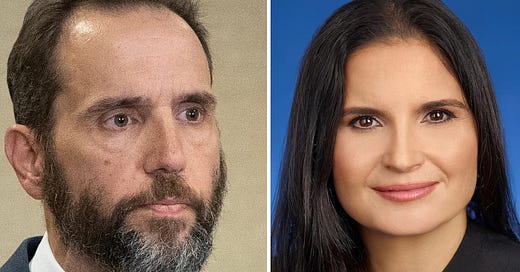
Jack Smith has Officially Taken Judge Cannon to the 11th Circuit
Special Counsel Jack Smith has filed his appeal of Judge Cannon's dismissal of the Obstruction and Espionage classified documents case on the grounds that he was appointed improperly.
The filing was due tomorrow, but Jack Smith docketed it today. Special Counsel has appealed Judge Cannon’s actions to the 11th circuit for the first time since he indicted Donald, Nauta, and DeOliveira on federal charges of Espionage and Obstruction of Justice. Jack Smith does NOT ask for her to be removed from the case in this filing.
Here is what Andrew McCabe and I discussed what to expect in the Special Counsel brief on the Jack podcast that aired last month:
Okay, so by statute, Garland can hire, and he hired Jack Smith to work for the DoJ. But what about the second key proposition above—that the Attorney General has authority to assign the supervision of the two criminal cases to anyone working at DOJ? The basis for that conclusion is a combination of 28 U.S.C. §§ 509 and 510.
Section 509 says “[a]ll” DOJ functions “are vested in the Attorney General,” even where another statute specifically assigns a particular function to other DOJ officials.
Section 510 provides the Attorney General a virtually unlimited power to delegate those authorities. It provides that the Attorney General “may from time to time make such provisions as he considers appropriate authorizing the performance by any other officer, employee, or agency of the Department of Justice of any function of the Attorney General.”
So 509 and 510 would seem to be enough to give Jack Smith statutory authority. But judge cannon spends a lot of time on Section 515 and 533 of Title 28 as well.
Starting with 515, which says The Attorney General or any other officer of the Department of Justice, or any attorney specially appointed by the Attorney General under law, may, when specifically directed by the Attorney General, conduct any kind of legal proceeding, civil or criminal, including grand jury proceedings and proceedings before committing magistrate judges, which United States attorneys are authorized by law to conduct, whether or not he is a resident of the district in which the proceeding is brought.
Now let’s talk about another statute the DoJ says gives it the authority to appoint Jack Smith: title 28 USC 533(1).
533(1) says “[t]he Attorney General may appoint officials— … to detect and prosecute crimes against the United States.” Attorneys General did not invoke Section 533(1) for special counsel appointments before Attorney General Garland included it in his 2022 appointment memorandum for Jack Smith. Special Prosecutor Leon Jaworski relied upon it, however, along with other statutes, in his Supreme Court brief in the Nixon tapes case. And in the Court’s decision in that case, Chief Justice Burger identified Section 533, together with Sections 509, 510 and 515, as establishing that Congress has vested the Attorney General with “the power to appoint subordinate officers”—including the special prosecutor Jaworski “to assist him in the discharge of his duties.”
So we said to keep an eye out for 28 U.S.C. §§ 509, 510, 515, and 533.
Well, guess what?
Jack Smith writes: Congress has bestowed on the Attorney General, like the heads of many Executive Departments, broad authority to structure the agency he leads to carry out the responsibilities imposed on him by law. Two statutes provide the Attorney General the specific authority to appoint special counsels to carry out his law-enforcement missions. 28 U.S.C. §§ 515(b), 533(1). Two other statutes confer on the Attorney General the necessary overarching authority to staff, structure, and direct the operations of the Justice Department, which includes the power to appoint inferior officers and assign specific matters to attorneys such as the Special Counsel. 28 U.S.C. §§ 509, 510. Precedent and history confirm those authorities, as do the long tradition of special-counsel appointments by Attorneys General and Congress’s endorsement of that practice through appropriations and other legislation. The district court’s contrary view conflicts with an otherwise unbroken course of decisions, including by the Supreme Court, that the Attorney General has such authority, and it is at odds with widespread and longstanding appointment practices in the Department of Justice and across the government. This Court should reverse.
And: The statutes that the Supreme Court cited in Nixon—28 U.S.C. §§ 509, 510, 515, and 533—authorized the Attorney General to appoint the Special Counsel here.
And even though Judge Cannon only relied on what she considered the unconstitutional appointment of Jack Smith, she did opine on the appropriateness of the funding of special counsel. In response, Special Counsel Jack Smith writes:
The Special Counsel is properly funded through the congressionally enacted “permanent indefinite appropriation” to “pay all necessary expenses of investigations and prosecutions by independent counsel appointed pursuant to the provisions of 28 U.S.C. 591 et seq. or other law.” The district court’s contrary conclusion depended solely on its erroneous determination that no “other law” supported the Special Counsel’s appointment. Dkt. 672 at 87. But Sections 509, 510, 515, and 533 authorized the Attorney General to appoint the Special Counsel, as the Supreme Court held in Nixon. Because its premise was wrong, so was its conclusion.
You can read the entire appeal brief here.
Thanks for reading, and thank you for listening to the Jack podcast!
~AG






I am so sick of looking at that photo of Aileen Cannon's insipid face.
Maybe the 11th Circuit judges will remove her?!